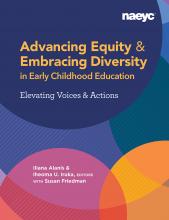Advancing Equity and Embracing Diversity in Early Childhood Education: Elevating Voices and Actions

About the Book

Table of Contents
- Acknowledgments
- Contributor List
- NAEYC’s “Advancing Equity in Early Childhood Education” Position Statement
-
Introduction
Iliana Alanís, Iheoma U. Iruka, and Susan Friedman - Part 1: Reflections on Equity
-
Section 1: Reflections on Ourselves
-
Chapter 1: Looking Inward: Reflections from Early Education Professionals on Their Journey to Reduce Bias and Racism
Iheoma U. Iruka, with Anthony Broughton, Michael Gonzalez, Jillian Herink, Steven Hicks, Tamara Johnson, Jen Neitzel, Karen Nemeth, Nicol Russell, and Shannon Wanless
-
Chapter 1: Looking Inward: Reflections from Early Education Professionals on Their Journey to Reduce Bias and Racism
-
Section 2: Reflections on Our Profession
-
Chapter 2: Why History? Educating the Early Childhood Workforce for Equity
Barbara T. Bowman -
Chapter 3: Quality Includes Removing Bias from Early Childhood Education Environments
Felicia L. DeHaney, Carla Thompson Payton, and Alandra Washington -
Chapter 4: Being an Equity Leader
John Nimmo, Debbie LeeKeenan, and Louise Derman‑Sparks -
Chapter 5: Recognizing Shortcomings of a Traditional Professional Knowledge Base
Tonia R. Durden and Stephanie M. Curenton
-
Chapter 2: Why History? Educating the Early Childhood Workforce for Equity
-
Part 2: Responsive Pedagogical Practices
-
Chapter 6: Creating Caring Communities in Early Childhood Contexts
Garnett S. Booker III -
Chapter 7: Focusing on What Really Counts: How Noticing and Appreciating Simple, Ordinary Moments in Early Childhood Care and Education Can Enrich Human Relationships and Promote Professional Equity
Junlei Li and Dana Winters -
Chapter 8: Developing the Three Cs of Reciprocity
Zeynep Isik‑Ercan -
Chapter 9: What About the Children? Teachers Cultivating and Nurturing the Voice and Agency of Young Children
Brian L. Wright -
Chapter 10: Equity, Diversity, and Child Development: Implications for Practice
Iliana Reyes, Mimi Gray, and Teresa Acevedo -
Chapter 11: Equitable Learning Opportunities for Young Bilingual Children: Strategies to Promote Oral Language Development
Dina C. Castro and Ximena Franco -
Chapter 12: Creating High‑Quality STEM Experiences for All Young Learners: What Do Teachers of Young Children Need to Know?
Jie‑Qi Chen -
Chapter 13: Developing Meaningful and Relevant Writing with K–3 Dual Language Learner Students
Daniel R. Meier -
Chapter 14: Providing Responsive Supports to Dual Language Learners with Disabilities
Lillian Durán -
Chapter 15: Making Thinking, Learning, and Development Visible and Inclusive Through Authentic Assessment
Hilary Seitz -
Chapter 16: Learning Stories: Observation, Reflection, and Narrative in Early Childhood Education
Isauro M. Escamilla
-
Chapter 6: Creating Caring Communities in Early Childhood Contexts
-
Part 3: Moving Forward as a Profession
-
Chapter 17: The Work: Promoting Equity and Justice in Early Childhood
Jen Neitzel -
Chapter 18: Agency and Power in Young Children’s Lives: Five Ways to Advocate for Social Justice as an Early Childhood Educator
Jennifer Keys Adair and Shubhi Sachdeva -
Chapter 19: Creating Anti‑Racist Early Childhood Spaces
Rosemarie Allen, Dorothy L. Shapland, Jen Neitzel, and Iheoma U. Iruka -
Chapter 20: Early Childhood Teacher Educators’ Critical Role: Preparing Culturally Efficacious Early Childhood Teachers
Belinda Bustos Flores, Socorro Herrera, and Janelle Beth Flores
-
Chapter 17: The Work: Promoting Equity and Justice in Early Childhood
- Appendix: A Note on Terminology Used in this Book
- About the Editors
- Index
Book Details
ISBN: 978-1-938113-78-9
Publish Date: 2021
Related Resources
Articles
Blog
Iliana Alanís, PhD, a native of South Texas, is a professor of early childhood and elementary education in the Department of Interdisciplinary Learning and Teaching at the University of Texas at San Antonio. She taught children in bilingual first- and second-grade classrooms while earning a master’s degree in curriculum and instruction with a concentration in bilingual education from the University of Texas–Pan American.

Iheoma U. Iruka, PhD, is research professor in public policy and founding director of the equity research action coalition at the Frank Porter Graham Child Development Institute at the University of North Carolina at Chapel Hill. Dr. Iruka is engaged in projects and initiatives focused on how evidence‑informed policies, systems, and practices in early education can support the optimal development and experiences of children who are from households with low income, ethnic minorities, and immigrants. She is focused on ensuring healthy development and excellence for young diverse learners, especially Black children, through classroom and family tools, the examination of nontraditional pedagogical approaches, public policies, and publications geared toward early education practitioners and policymakers. She is an author of several books, including Don’t Look Away: Embracing Anti‑Bias Classrooms (Gryphon House, 2020). Dr. Iruka serves or has served on numerous national boards and committees, including the Brady Education Foundation, the American Psychological Association’s Board of Educational Affairs Task Force on Racial and Ethnic Disparities, and the National Academies of Sciences, Engineering, and Medicine committees on Supporting Parents of Young Children and Applying Neurobiological and Socio‑Behavioral Sciences from Prenatal through Early Childhood Development: A Health Equity Approach.
Susan Friedman is senior director of publications and content development at NAEYC.
Reviews
In a time when issues of diversity, equity, inclusion, and access are at the forefront in education, this volume offers timely and critical recommendations for policy and practice. The coeditors bring together a stellar group of experts in the field that delineate how we can enact equitable and inclusive early childhood education founded on NAEYC’s “Advancing Equity in Early Childhood Education” position statement and its recommendations. A must-read for all early childhood educators.
—Sonia W. Soltero, Professor and Chair, Department of Leadership, Language, and Curriculum, DePaul University
NAEYC’s position statement on advancing equity is not just words on paper, it is the heart and soul of who we are as people who care for all children. In this book, editors Iliana Alanís, Iheoma Iruka, and Susan Friedman have gathered stories and insights from dozens of early childhood education professionals, leading us forward into a beloved community framed in social justice.
—Josh Thompson, Associate Professor of Early Childhood Education, Texas A&M University-Commerce
This book confronts us with the inequities present in early childhood education. It compels us not to remain silent, compliant, or complicit, but rather to take anti-racist actions at every level—classroom, program, teacher preparation, and policy.
—Cristina Gillanders, Associate Professor, University of Colorado Denver
This text is comprehensive in its approach to addressing equity and diversity in our field. The diverse group of contributors offers research-based expertise centering a variety of social identities. Regardless of role, this book provides useful information for improving practice.
—Toni Sturdivant, Assistant Professor of Curriculum and Instruction, Texas A&M University-Commerce
